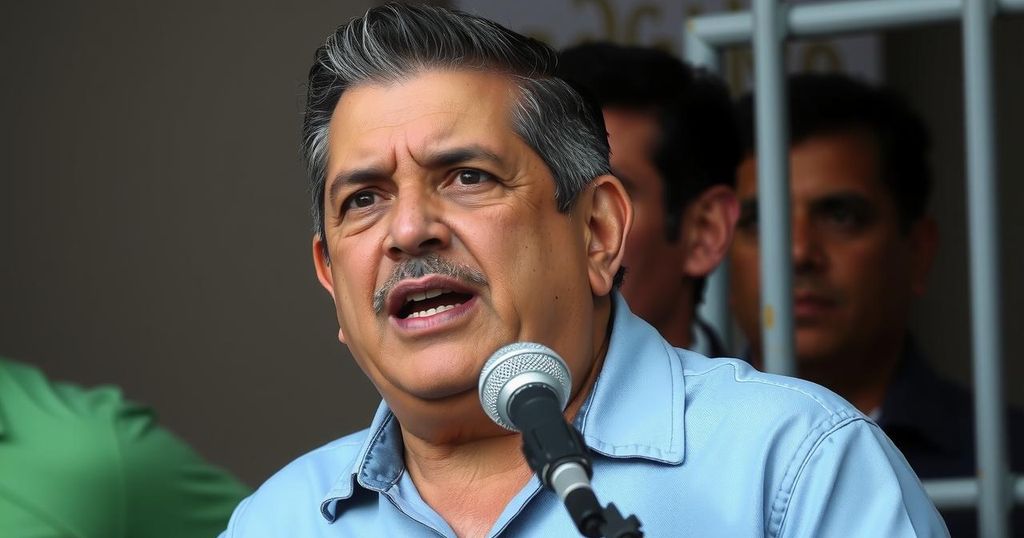Venezuela’s government has stated it will arrest opposition leader Edmundo Gonzalez Urrutia if he returns to the country, following his claim of winning the 2024 presidential election. The National Assembly has announced a $100,000 bounty for Gonzalez’s whereabouts. Meanwhile, Gonzalez plans to travel to the U.S. and has garnered recognition as the legitimate president-elect from several nations, despite Maduro’s controversial re-election.
Venezuela’s government has reaffirmed its intention to detain opposition leader Edmundo Gonzalez Urrutia, who asserts he won the 2024 presidential election against Nicolás Maduro. The ruling party-controlled congress, through National Assembly leader Jorge Rodriguez, has indicated that an order for Gonzalez’s immediate arrest will be issued if he returns to Venezuela. This action follows a recently announced $100,000 bounty for information regarding Gonzalez’s location and coincides with the imminent commencement of the next presidential term in the country, scheduled for January 10.
Gonzalez, who departed Venezuela in September following an arrest warrant connected to an election investigation, has expressed intentions to return to the country, although the government asserts that this would result in his apprehension. Rodriguez emphasized the determination of the National Assembly to act against Gonzalez, labeling him as “that unworthy being” while underscoring the assembly’s duty to maintain peace and security within the nation.
Following recent engagements in Argentina and Uruguay, where he met with various political figures, including Uruguayan President Luis Lacalle Pou, Gonzalez announced plans to visit the United States and hopes for a meeting with President Joe Biden. Meanwhile, President Maduro prepares for his inauguration for a third term amid widespread international disapproval regarding the lack of transparency in the electoral process that declared him the winner.
Despite official election results favoring Maduro, opposition claims, based on independently collected data from electoral machines, suggest Gonzalez obtained double the votes. This demonstrates significant contention surrounding the legitimacy of the election results, further augmented by invitations extended to Maduro by the National Assembly for his swearing-in ceremony. The political landscape remains charged as Gonzalez aims to assert his role as the recognized leader, facing substantial challenges due to the government’s fortified stance against dissenting voices.
The context surrounding the political tensions in Venezuela is marked by the ongoing conflict between the ruling party led by President Nicolás Maduro and the opposition, particularly represented by Edmundo Gonzalez Urrutia. Following the controversial 2024 presidential election, where Gonzalez argues he achieved victory, he has gained recognition from several countries as the legitimate president-elect. However, his claims have led to repercussions from the Maduro government, which has issued arrest warrants and threats against him, demonstrating the complexities and challenges faced by opposition leaders in Venezuela’s political arena. Gonzalez’s departure from Venezuela to Spain after facing legal troubles exemplifies the perils confronting dissenters in a regime that exerts control over institutional frameworks and law enforcement. The political climate remains fraught with disputes over electoral integrity and the legitimacy of governance, as highlighted by the reaction from international communities regarding the election process and outcomes, further complicating Venezuela’s socio-political landscape.
In conclusion, Edmundo Gonzalez Urrutia’s claim of victory over President Maduro highlights a significant political crisis in Venezuela characterized by governmental repression and international scrutiny. The threats of arrest against Gonzalez underscore the regime’s intolerance for opposition, while the contrasting narratives of electoral legitimacy raise pressing questions about democracy in Venezuela. The ongoing developments will undoubtedly influence not only Venezuela’s internal dynamics but also its relations with global powers and international governance standards.
Original Source: apnews.com






